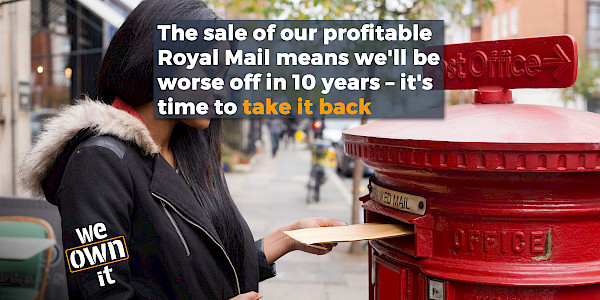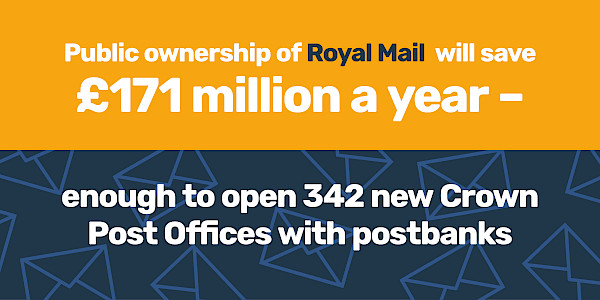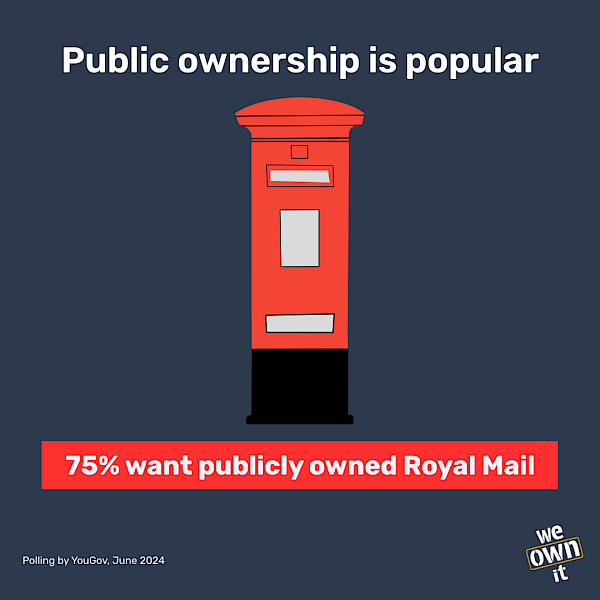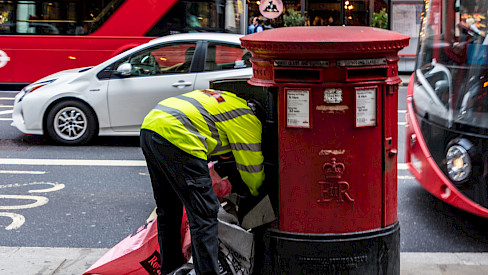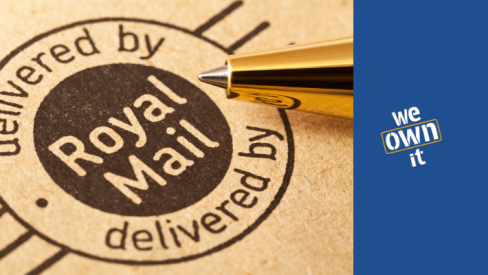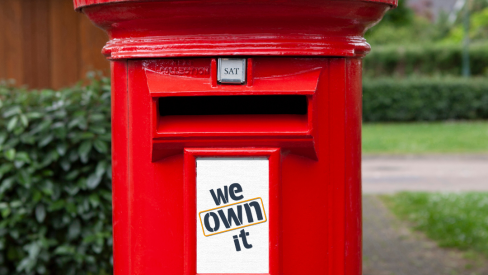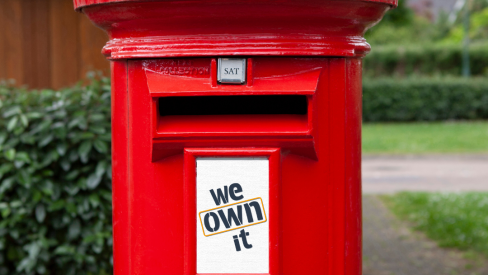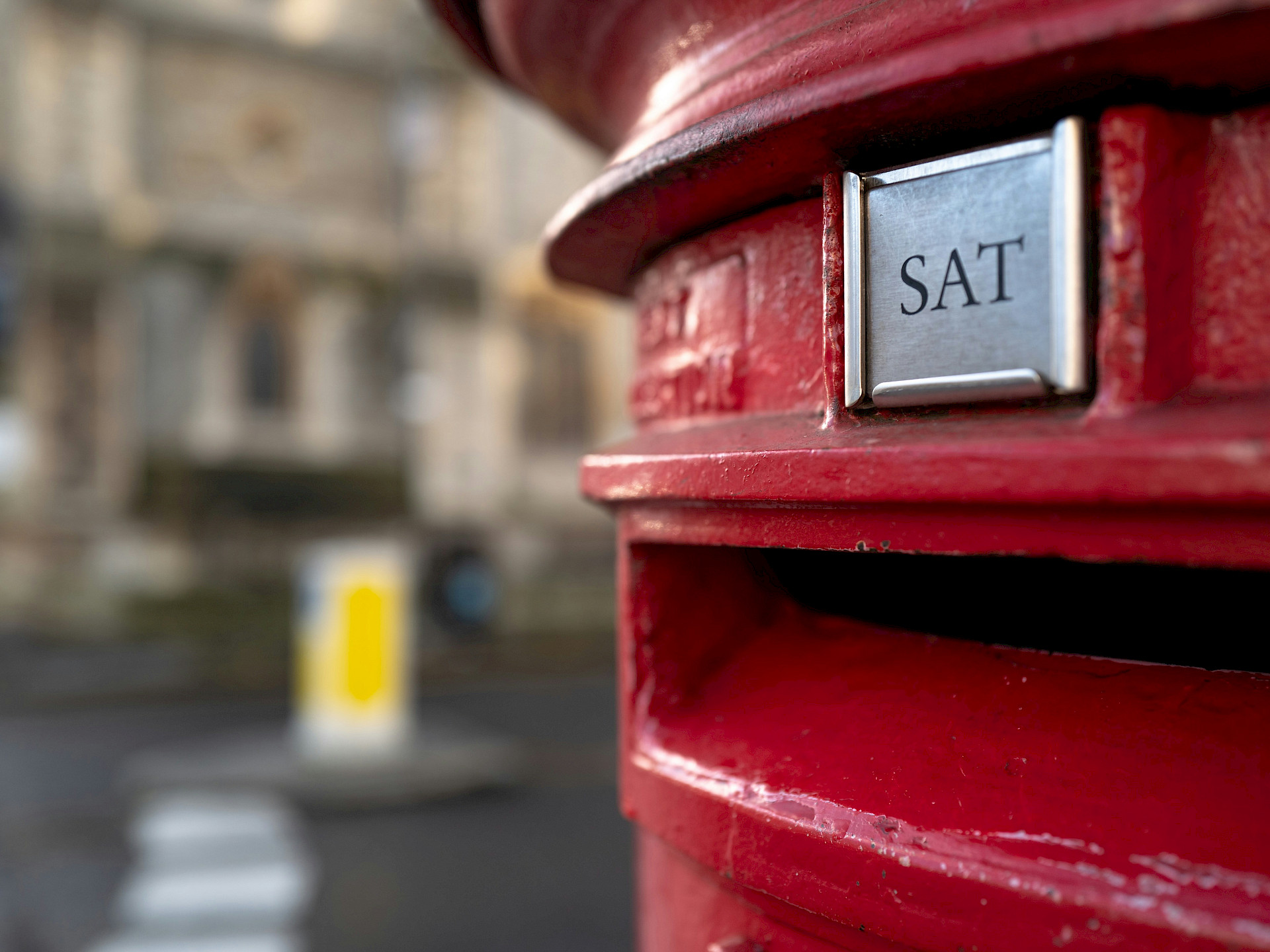
Royal Mail runs our postal service under the terms of the Universal Service Obligation (USO), meaning it has the responsibility to deliver to everyone across the UK, six days a week, for the same affordable price, and to the same standard.
Posties are at the heart of our communities, sorting and delivering the letters and parcels that keep us connected. But in the last decade, our postal service has been sold off and run for private profit. It’s time to take our post back.
Key facts
-
65% of people say post is important to them for staying in touch with friends and family, while 79% say there are things they will always need to send by post.
-
By bringing Royal Mail into public ownership, we'd save £230 million a year, enough to open 342 new Crown Post Offices with post banks.
-
Our research, in collaboration with the New Economics Foundation, shows that by just 2025 – only 10 years after the sale – we’ll be worse off than if Royal Mail had remained public.
-
Meanwhile, postage costs for senders have more than doubled in the last decade. In 2019, following the biggest price rise in 5 years, Royal Mail was forced to apologise after hiking stamp prices up by an amount that breached Ofcom’s price cap. However, price rises announced in October 2023 mean that the cost of a first-class stamp has risen by 47% in 18 months.
- Royal Mail is failing its customers. In line with the familiar pattern of privatisation, service standards have fallen while prices have risen, for the public and business customers alike. In 2023 the deteriorating service resulted in Royal Mail losing its monopoly on delivering from Post Office sites, it had to pay out £26 million in compensation, and was fined a paltry £5.6 million by its regulator, Ofcom.
- This declining performance has paved the way for rival suppliers like Amazon to enter the market. They deploy a ‘Delivery Service Partner’ model, with fleets of drivers operating under the Amazon brand without being technically employed by them. Despite the American retail giant rapidly gaining market share, they still rely on Royal Mail to deliver to the UK’s harder-to-reach locations such as Orkney Islands, as the USO requires it to do. Amazon has also been accused of a contempt for UK consumer law, by requiring claimants for lost parcels to submit a police report.
The history
Launched in 1516 by Henry VIII, the Royal Mail was intended to support royal communications, but broadened its remit in response to generational rises in literacy and trade. Nearly 500 years later, the Conservative-Liberal Democrat coalition government passed the Postal Services Act of 2011, allowing for 90% of Royal Mail to be privatised (with 10% of shares offered to staff). Royal Mail and The Post Office were legally separated in 2012.
In 2013, Vince Cable announced that Royal Mail shares would be floated on the London Stock Exchange, despite 96% of Royal Mail staff opposing the sale. The last public shares were flogged off in 2015, and since then our postal service has been run for the profit of private shareholders.
Who owns Royal Mail?
Now that it’s privatised, Royal Mail is part of International Distributions Services, which also contains General Logistics Systems and Parcelforce. In 2021, investors were paid £400 million in dividends. And even though the company made a half-year £319 million loss in 2023, shareholders in parent company IDS have been promised a “modest” dividend.
Daniel Křetínský had his takeover bid for the company approved in December 2024. Find out more about the Czech billionaire behind the sale of our mail.
Why we should renationalise Royal Mail
Our universal postal service is an important public service, ensuring that we’re able to reach one another through the post from John O’Groats to Land’s End - and the islands beyond!
This universal service is at risk as long as it’s in private hands. Long-term pressure from shareholders wanting to make more for their investments is seeing delivery offices, routes and capacity cut, resulting in huge backlogs and delays. At the same time, stamp prices are hiked up year on year. It is currently attempting to downgrade its obligations under the USO by stopping deliveries of mail on Saturdays - a move condemned by subscriptions businesses, the Greetings Card Association, and consumer organisations. Separately, there are recent reports of posties being instructed to leave letters behind, and told to prioritise parcels over less profitable letters. New We Own It analysis has revealed that Royal Mail's parent company has paid out over £230 million per year in dividends to shareholders for the last decade.
Our postal workers deserve dignity in their working conditions and a fair wage. With Royal Mail run for the profit of a few, ‘efficiency’ savings have been introduced to maximise profit - and its posties and the public paying the price. This includes introducing tracking devices (PDAs), piling pressure on posties to deliver more per day for less money. And in a landmark court case, Parcelforce delivery drivers are suing Royal Mail for classifying them as self-employed - thus enabling the company to avoid paying sick leave pay and minimum wage. Read our blog for a postal worker’s testimony, explaining how ‘they have degraded me and degraded my job in order to squeeze out more profits for their shareholders’.
These changes are a clear deviation from its service obligations - a way of working forced on posties by a rapid succession of bosses desperate to put shareholders before service, and profits before people, punctuality - and the post!
We believe the best way to ensure a viable future for our post and postal delivery services is to bring it back together with the Post Office; renationalise the combined service; and make it accountable to the public and to staff so it can work for our communities. With renationalisation we could and should expect decent terms and conditions for its workers - providing a model for future standards across the industry. If Royal Mail were run for people not profit again, postal workers wouldn’t be squeezed for every last second of their round, and could be properly resourced to provide this vital community service.
FAQs
How much would it cost to nationalise Royal Mail?
Buying back Royal Mail would cost around £3.6 billion, which would be paid in compensation to shareholders, returning their original investment. By taking Royal Mail into public hands, the public would save £230 million per year, which could be reinvested back into our postal service.
Is Royal Mail a monopoly?
Effectively, yes. In 2006, under Tony Blair’s Labour government, the postal service market was opened up to competition for the first time in history. This means that other companies are allowed to collect, transport and deliver letters and charge customers for the service. However, since running an efficient 6 day a week, universal postal service requires a UK wide network, hundreds of thousands of workers, and running logistics on a huge scale, no other company can do the job of Royal Mail - and none are able to come close to competing. The idea that opening up a market to give customers a choice, and that this will drive up standards, has proven impossible.
However, Royal Mail’s rivals (companies such as DHL, UK Mail, Citipost) are able to make a profit through ‘downstream access’: collecting and distributing mail themselves, but then handing it over to Royal Mail staff to process and deliver.
What makes Royal Mail different to other companies?
Courier companies such as Hermes and DPD deliver parcels, but are unable to provide a postal service. The difference is that a courier service is used to deliver packages at speed for a greater expense. They are not able to provide an affordable, universal service, and so could refuse to deliver to an address, or charge more for greater distances. Amazon is able to deliver by using these courier services and Royal Mail, and does not run its own delivery service.
Why was Royal Mail privatised?
Politicians justified the sale by saying it was failing, but it wasn’t - privatising was an ideological decision. Just before being sold off, Royal Mail’s annual profits had risen to £324 million, with a high level of public satisfaction with the service.
Who sold off the Royal Mail?
The process of privatisation was started by Liberal Democrat Vince Cable, the Business Secretary in the Coalition government of 2010. He pushed the changes to the law required to allow the sale, and oversaw the initial sale in 2013. George Osbourne, Conservative Chancellor of the Exchequer, announced the sale of the government’s final 30% stake in 2015.
How much was Royal Mail sold for when it ‘went private’?
The government rushed through the sale, undervaluing the public asset and flogging it off at a price that cost the public billions. Investment bank JP Morgan valued Royal Mail at £10 billion in 2013, but the government valued it at just £3.3 billion - though shares increased to a total value of £5 billion when released on the stock market.
What’s the difference between Royal Mail and the Post Office? Does Royal Mail own the Post Office?
The Post Office is owned by the government, and operates the 11,500 post offices around the UK. Royal Mail is owned by private shareholders, and runs the collection, sorting and delivery of post.
It is difficult for Post Offices to make a profit - so with Royal Mail in public hands, it was able to reinvest profits into making sure the places you go to buy stamps are well staffed and equipped. The decision to separate the two in 1986 has now resulted in huge pressure on Post Offices, meaning longer queues for us all at Christmas, while Royal Mail profits are syphoned out in dividends to private individuals.
Related news
-
28 Jan 2026 Source: www.theguardian.com
-
-
Royal Mail told plans to slash second-class post could 'harm people'
- Media Mention
- Royal Mail
18 Apr 2025 Source: www.express.co.uk -
Royal Mail takeover by Czech billionaire Daniel Křetínský approved
- Royal Mail
16 Dec 2024 Source: www.theguardian.com -

